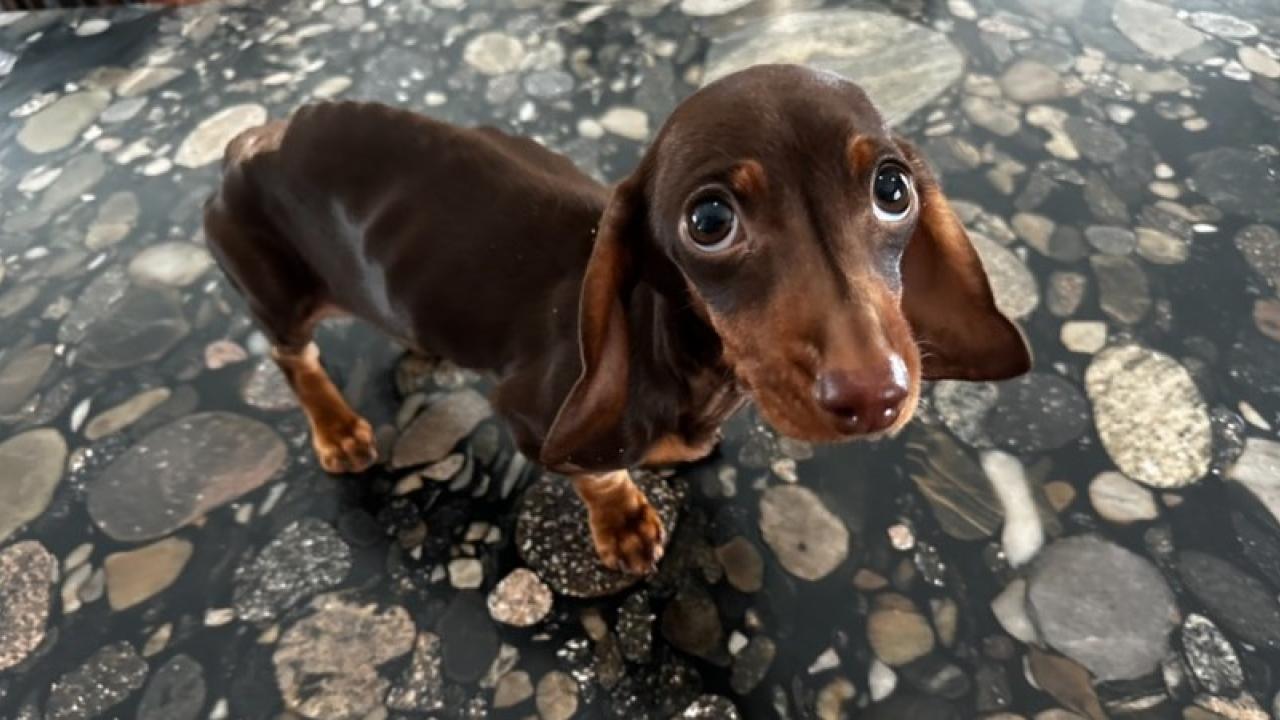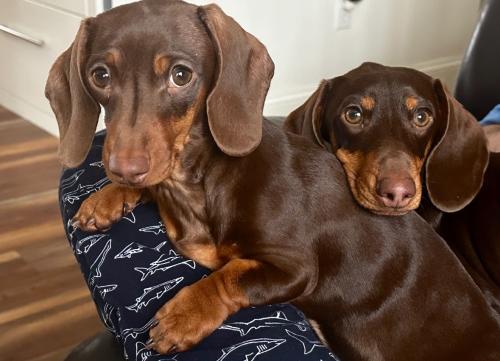
Puppy Travels from Alaska for Specialty Care at UC Davis
“Case of the Month” – April 2024

Scout, a 7-month-old female miniature Dachshund, had a rough start to her life in Anchorage, Alaska, where she lives with her littermate brother Finn, and another miniature Dachshund, 2-year-old Leroy, along with her owners, Karen and Gene Richardson. By the age of 3 months, it was discovered that Scout was born with incorrect blood vessel connections leading to her liver. Called an arteriovenous malformation (AVM), this condition results in attachments between many veins and arteries preventing appropriate blood flow to an organ or organs. This condition can be fatal as it often progresses to organ failure and the development of subsequent systemic issues.
That was the case with Scout, as the AVM wasn’t allowing proper blood flow to her liver, altering liver growth and preventing filtering/cleaning of her blood.
The Richardsons noticed Scout’s abdomen was beginning to swell in late November 2023. They took her to a veterinary emergency room where bloodwork showed her liver values were extremely elevated. Their primary care veterinarian then referred her to a specialty care clinic in Alaska, where chance would have it, a visiting specialist from North Carolina was on staff that week.
After performing a CT scan on Scout, the visiting specialist recognized the AVM. Because of the nature of the disease, a referral was necessary, and she connected the Richardsons with Dr. Bill Culp at the UC Davis veterinary hospital.
Only a handful of facilities in the country can treat this rare condition, so pet owners usually must go to great lengths to find a specialist with experience correcting AVMs. Dr. Culp and the UC Davis team have been successfully treating the condition for 15 years.
“We were so fortunate to be connected with Dr. Culp,” Karen stated. “The communication was unlike any I’ve ever experienced. He responded immediately and was so engaged. He intently listened to all our concerns and answered all our questions.”
An appointment was set for April 2024 at UC Davis, but by January, Scout’s condition worsened. She wasn’t eating and was rapidly losing weight. She was producing bloody stools, and fluid continued to build up in her abdomen that needed to be drained.
Following two more visits to the emergency room, Karen’s 26 years of experience as a registered nurse in emergency medicine made her realize that Scout wouldn’t make it until April.
Dr. Culp agreed to see her sooner, and the Richardsons quickly traveled to California.
“Dr. Culp wasn’t positive Scout could be a candidate for surgery until he was able to examine her in person,” said Gene. “But her condition was getting worse, and UC Davis seemed our only hope. So, we flew down there on a leap of faith.”

Dr. Culp examined Scout on a Monday in late January and performed an AVM embolization on her the following day. The procedure was performed primarily with minimally invasive techniques (interventional radiology), utilizing access through the femoral artery to be able to treat the liver. Fluoroscopy (real time “x-rays”) allowed Dr. Culp to utilize specialized guidewires and catheters to access the location of the malformation. Once there, Scout’s AVM was blocked with a liquid embolic (medical glue), stopping further blood flow through the malformation and properly redirecting it to her liver.
Scout recovered well after surgery and was discharged by the end of the week. Now almost three months after surgery, the Richardsons report she is doing great. Her primary care veterinarian in Anchorage continues to monitor the situation, and Scout’s liver function is back to normal.
“She has been asymptomatic since the surgery,” Karen said. “She’s healthy and growing. We’re in awe of her recovery.”
After reaching a low of 4 pounds, Scout is now up to 8 pounds and catching up to brother Finn at 11 pounds.
“We were so happy to get to work with UC Davis,” Gene said. “The entire surgery team impressed us beyond our imagination.”
# # #
